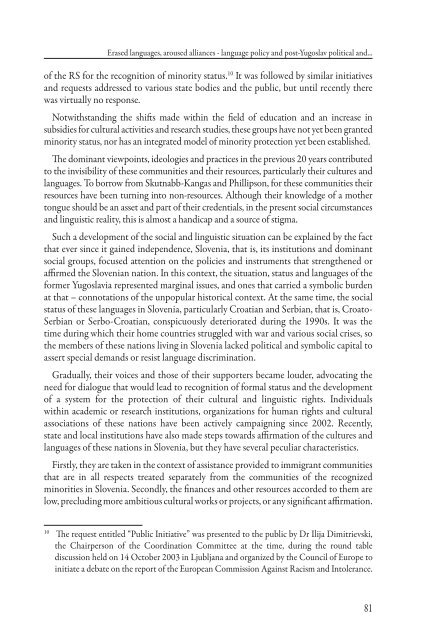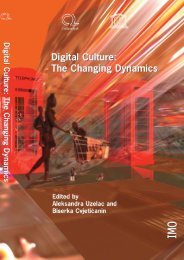free download in pdf format - Culturelink Network
free download in pdf format - Culturelink Network
free download in pdf format - Culturelink Network
You also want an ePaper? Increase the reach of your titles
YUMPU automatically turns print PDFs into web optimized ePapers that Google loves.
Erased languages, aroused alliances - language policy and post-Yugoslav political and...<br />
of the RS for the recognition of m<strong>in</strong>ority status. 10 It was followed by similar <strong>in</strong>itiatives<br />
and requests addressed to various state bodies and the public, but until recently there<br />
was virtually no response.<br />
Notwithstand<strong>in</strong>g the shift s made with<strong>in</strong> the fi eld of education and an <strong>in</strong>crease <strong>in</strong><br />
subsidies for cultural activities and research studies, these groups have not yet been granted<br />
m<strong>in</strong>ority status, nor has an <strong>in</strong>tegrated model of m<strong>in</strong>ority protection yet been established.<br />
Th e dom<strong>in</strong>ant viewpo<strong>in</strong>ts, ideologies and practices <strong>in</strong> the previous 20 years contributed<br />
to the <strong>in</strong>visibility of these communities and their resources, particularly their cultures and<br />
languages. To borrow from Skutnabb-Kangas and Phillipson, for these communities their<br />
resources have been turn<strong>in</strong>g <strong>in</strong>to non-resources. Although their knowledge of a mother<br />
tongue should be an asset and part of their credentials, <strong>in</strong> the present social circumstances<br />
and l<strong>in</strong>guistic reality, this is almost a handicap and a source of stigma.<br />
Such a development of the social and l<strong>in</strong>guistic situation can be expla<strong>in</strong>ed by the fact<br />
that ever s<strong>in</strong>ce it ga<strong>in</strong>ed <strong>in</strong>dependence, Slovenia, that is, its <strong>in</strong>stitutions and dom<strong>in</strong>ant<br />
social groups, focused attention on the policies and <strong>in</strong>struments that strengthened or<br />
affi rmed the Slovenian nation. In this context, the situation, status and languages of the<br />
former Yugoslavia represented marg<strong>in</strong>al issues, and ones that carried a symbolic burden<br />
at that – connotations of the unpopular historical context. At the same time, the social<br />
status of these languages <strong>in</strong> Slovenia, particularly Croatian and Serbian, that is, Croato-<br />
Serbian or Serbo-Croatian, conspicuously deteriorated dur<strong>in</strong>g the 1990s. It was the<br />
time dur<strong>in</strong>g which their home countries struggled with war and various social crises, so<br />
the members of these nations liv<strong>in</strong>g <strong>in</strong> Slovenia lacked political and symbolic capital to<br />
assert special demands or resist language discrim<strong>in</strong>ation.<br />
Gradually, their voices and those of their supporters became louder, advocat<strong>in</strong>g the<br />
need for dialogue that would lead to recognition of formal status and the development<br />
of a system for the protection of their cultural and l<strong>in</strong>guistic rights. Individuals<br />
with<strong>in</strong> academic or research <strong>in</strong>stitutions, organizations for human rights and cultural<br />
associations of these nations have been actively campaign<strong>in</strong>g s<strong>in</strong>ce 2002. Recently,<br />
state and local <strong>in</strong>stitutions have also made steps towards affi rmation of the cultures and<br />
languages of these nations <strong>in</strong> Slovenia, but they have several peculiar characteristics.<br />
Firstly, they are taken <strong>in</strong> the context of assistance provided to immigrant communities<br />
that are <strong>in</strong> all respects treated separately from the communities of the recognized<br />
m<strong>in</strong>orities <strong>in</strong> Slovenia. Secondly, the fi nances and other resources accorded to them are<br />
low, preclud<strong>in</strong>g more ambitious cultural works or projects, or any signifi cant affi rmation.<br />
10 Th e request entitled “Public Initiative” was presented to the public by Dr Ilija Dimitrievski,<br />
the Chairperson of the Coord<strong>in</strong>ation Committee at the time, dur<strong>in</strong>g the round table<br />
discussion held on 14 October 2003 <strong>in</strong> Ljubljana and organized by the Council of Europe to<br />
<strong>in</strong>itiate a debate on the report of the European Commission Aga<strong>in</strong>st Racism and Intolerance.<br />
81



